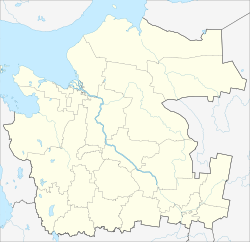Severoonezhsk
| Severoonezhsk (English) Североонежск (Russian) |
|
|---|---|
| - Urban-type settlement - | |
 view of houses in the town |
|
 Location of Arkhangelsk Oblast in Russia |
|
|
|
|
|
|
|
| Administrative status | |
| Country | Russia |
| Federal subject | Arkhangelsk Oblast |
| Administrative district | Plesetsky District |
| Municipal status (as of July 2011) | |
| Municipal district | Plesetsky Municipal District |
| Urban settlement | Severoonezhskoye Urban Settlement |
| Administrative center of | Severoonezhskoye Urban Settlement |
| Statistics | |
| Population (2010 Census) | 5,289 inhabitants |
| Time zone | MSK (UTC+03:00) |
| Founded | 1973 |
| Postal code(s) | 164268 |
| on | |
Severoonezhsk (Russian: Североонежск) is an urban locality (an urban-type settlement) in Plesetsky District of Arkhangelsk Oblast, Russia, located 55 kilometers (34 mi) west of the town of Mirny, on the left bank of the Onega River. Municipally, it is the administrative center of Severoonezhskoye Urban Settlement, one of the eight urban settlements in the district. Population: 5,289 (2010 Census);5,624 (2002 Census);6,223 (1989 Census)..
Severoonezhsk is located on the left bank of the Onega River, several kilometers downstream from the mouth of the Iksa River, the left tributary of the Onega. On the right bank of the Onega, across Severoonezhsk, stands the urban-type settlement of Oksovsky.
The first house in Severoonezhsk was built in February 1973 shortly after huge deposits of bauxite were discovered. Until 1985, Severoonezhsk was subordinate to the urban-type settlement of Oksovsky. On July 8, 1985, Severoonezhsk was granted urban-type settlement status itself, and was split from Oksovsky; with its territory including the whole area on the left bank of the Onega which had been part of Oksovsky.
At the beginning of 1970, there were plans to build an aluminum production plant close to the bauxite deposits. It was planned that the plant would be served by a city with the population of approximately 100,000, with the name of Severorossiysk, located on both banks of the Onega. The plans were supported by Hungary and Bulgaria, who were interested in becoming the shareholders. The plans have never been realized.
...
Wikipedia

